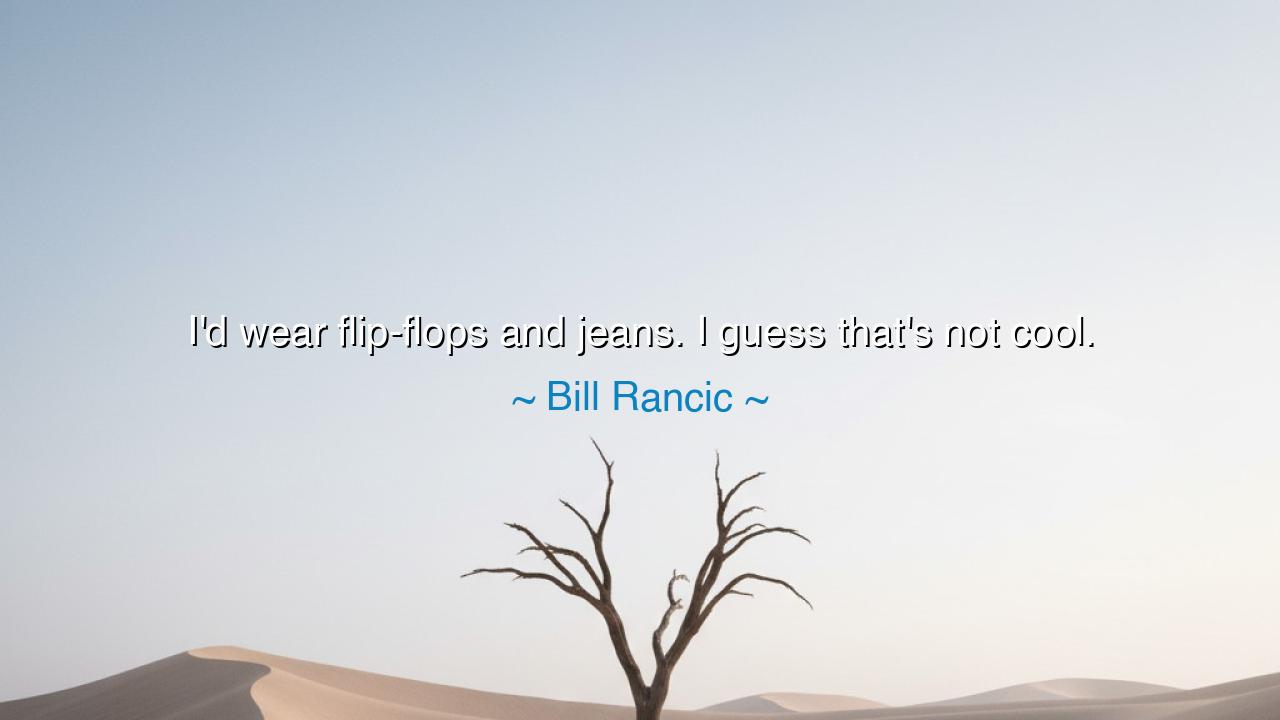
I'd wear flip-flops and jeans. I guess that's not cool.






"I'd wear flip-flops and jeans. I guess that's not cool." These words from Bill Rancic reflect a deep truth about the tensions between individuality and societal expectation. In a world where appearance and conformity often take precedence over authenticity, Rancic's comment highlights the internal struggle many face when it comes to expressing themselves in ways that might not align with what is considered socially acceptable or fashionable. His playful remark about wearing flip-flops and jeans reveals the pressure we place on ourselves to adhere to a particular image, often at the expense of personal comfort and authentic expression.
In ancient times, the idea of conformity was often tied to status, tradition, and respect. To wear the right robes or adorn oneself with the correct symbols was a way to indicate one’s place in society. In ancient Rome, for example, the tunic was a symbol of citizenship, and different colors and styles could indicate one’s rank or role within the empire. Similarly, Greek philosophers often donned simple robes, yet their ideas and actions set them apart from the fashionable elite of their time. Socrates was not concerned with appearances; instead, he was renowned for his focus on the mind and virtue. In this way, Rancic’s words remind us that the essence of a person cannot be reduced to the external—their character, values, and actions define their true worth.
Just as the ancients understood the importance of virtue and wisdom over external displays of wealth or status, so too should we embrace the idea that coolness and authenticity come from within. Rancic’s statement about flip-flops and jeans reveals an honesty that transcends trends. By admitting that he is not concerned with fitting in or adhering to conventional norms, he reflects a desire to embrace personal freedom and to live without the shackles of social expectations. This desire for genuine self-expression is timeless and speaks to the human need for individuality—the right to be oneself, regardless of what is considered "cool."
This tension between personal expression and societal expectation is also seen in the story of Leonardo da Vinci, who, despite his genius, was often an outsider to the circles of wealthy patrons. He did not conform to the fashion of his time, choosing to focus instead on his art and science. His clothing may have been simple and unadorned, but his work transcended the superficial norms of his age, leaving a lasting legacy of creativity and innovation. Like Rancic, da Vinci’s coolness was not in what he wore but in what he created—a true reflection of individuality and authentic expression.
The world today often emphasizes external appearance and the mask of success—whether through the clothes we wear, the cars we drive, or the way we present ourselves on social media. Yet, as Rancic points out, this external fixation can distract us from the true value of authenticity. To be real, to embrace one’s own unique style—whether it’s flip-flops, jeans, or something entirely different—is to reject the artificial standards imposed by society and instead embrace what feels true to who we are. True greatness lies not in outward appearance but in the depth of our character and our ability to stay true to ourselves.
The lesson here is clear: individuality is not something to be hidden or ashamed of. In a world where conformity often reigns supreme, those who dare to live authentically—like Rancic—offer a powerful example of the courage it takes to express oneself without the fear of judgment. In the ancient world, those who stood apart from the crowd were often remembered as visionaries and leaders, not because they followed the trends of their time, but because they embraced their own truth. Just as Socrates and da Vinci left legacies that transcended the superficial standards of their eras, we too must have the courage to step away from the fickle nature of societal approval and express our true selves.
Let us take action by embracing our uniqueness, understanding that the true measure of our worth is not in our appearance or external validation but in our ability to remain authentic to who we are. Whether in the clothes we wear, the work we do, or the way we interact with the world, let us remember that coolness is not a matter of fitting in, but of standing tall in our individuality and integrity. Let us wear our flip-flops and jeans with pride, knowing that it is our authenticity that will make the greatest impression, not the fleeting judgments of others. The future belongs to those who are true to themselves, and in embracing our individuality, we help shape a world that values honesty, freedom, and self-expression.






AAdministratorAdministrator
Welcome, honored guests. Please leave a comment, we will respond soon